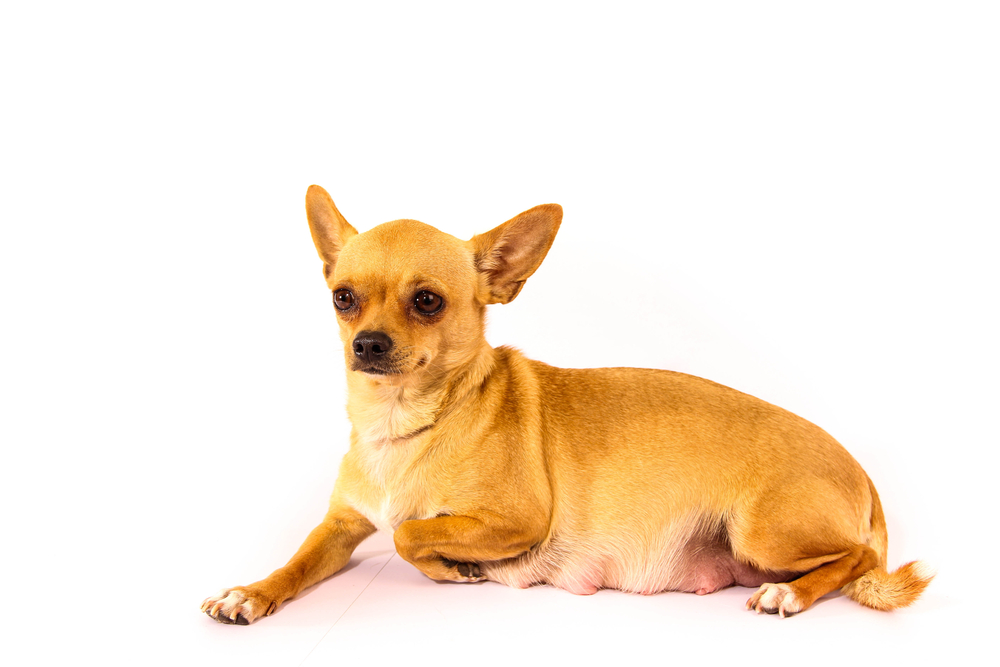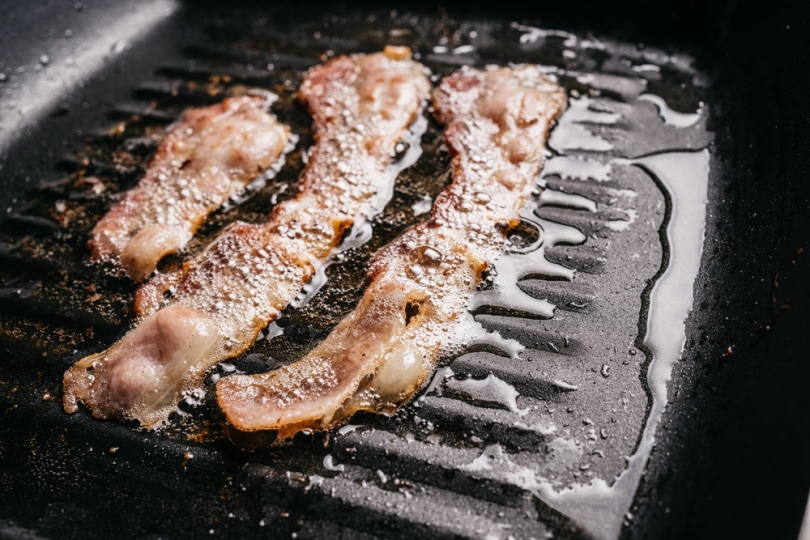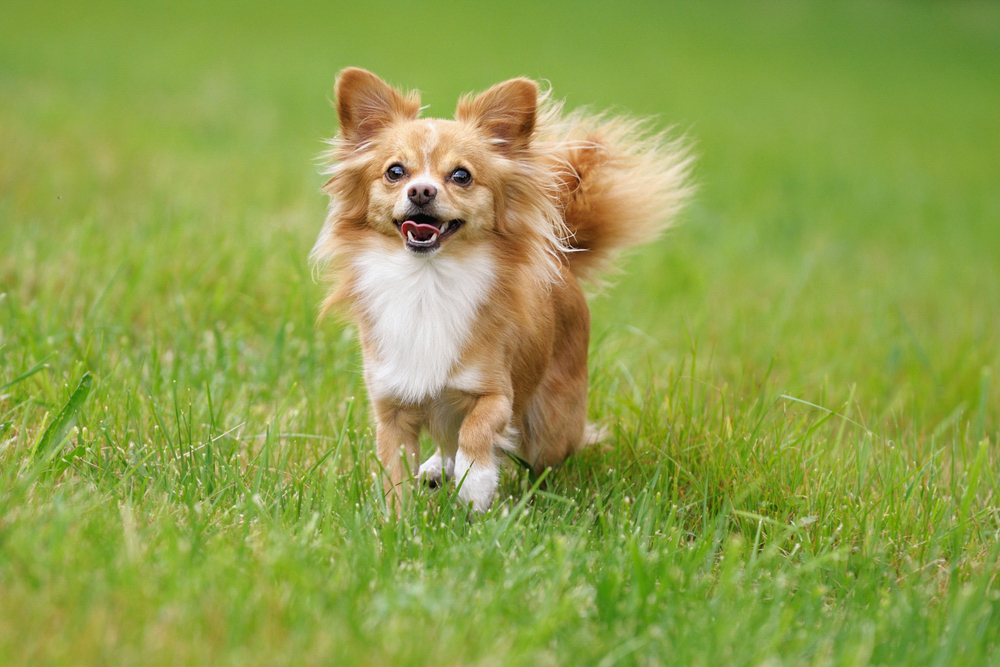Click to Skip Ahead
When it comes to food, dogs are notoriously greedy, even desiring their owners’ food. But not all the foods that humans can consume are healthy or safe for our pets. Unhealthy or toxic foods can cause severe adverse reactions and even death.
A delicious hazelnut spread, Nutella also contains chocolate, which makes it toxic for dogs if it is consumed in amounts enough to cause toxicity (this amount depends on your dog’s size, age, and other factors).
Basically, if you want to have a healthy dog and not expose them to the risk of chocolate poisoning, do not let them consume Nutella. If your dog has already eaten some, it is best to consult your veterinarian immediately.
In this article, you will learn why Nutella is not recommended for dogs, the signs of Nutella poisoning, and what you can do if your dog has consumed Nutella.
PangoVet. It’s an online service where you can <b>talk to a vet online</b> and get the personalized advice you need for your pet — all at an affordable price!
</p>
<div class="su-button-center"><a href=https://www.dogster.com/ask-the-vet/"https://pangovet.com/?utm_source=dogster&utm_medium=article&utm_campaign=dog_eat_drink%22 class="su-button su-button-style-default" style="color:#FFFFFF;background-color:#FF6600;border-color:#cc5200;border-radius:9px;-moz-border-radius:9px;-webkit-border-radius:9px" target="_blank" rel="nofollow"><span style="color:#FFFFFF;padding:0px 24px;font-size:18px;line-height:36px;border-color:#ff944d;border-radius:9px;-moz-border-radius:9px;-webkit-border-radius:9px;text-shadow:none;-moz-text-shadow:none;-webkit-text-shadow:none"> Click to Speak With a Vet</span></a></div></div></div>"}" data-sheets-userformat="{"2":513,"3":{"1":0},"12":0}"> If you need to speak with a vet but can’t get to one, head over to PangoVet. It’s an online service where you can talk to a vet online and get the personalized advice you need for your pet — all at an affordable price!

Can Dogs Eat Nutella?
Nutella is considered toxic for dogs because it contains chocolate. Although it does not contain that much cocoa (7.4%), the risk of adverse effects depends on several factors, the most crucial one being the size of your dog. For example, a 100 pound dog will react differently to licking a teaspoon of Nutella than a 2 pound dog would.
Even if your dog doesn’t consume a toxic dose, you should still keep Nutella away from them. Nutella is a chocolate and hazelnut spread, and it is not recommended for dogs due to the cocoa that it contains. It also contains other ingredients that are not toxic for dogs but should still be avoided because they are unhealthy.
- Sugar — Nutella contains a high concentration of sugar, and it is the first ingredient in the composition of the product. Although sugar is not toxic to dogs, it is not healthy in their daily diet.
- Milk powder — Dairy is safe for dogs to consume, as long as they are not allergic to it, but they still shouldn’t eat much of it.
- Hazelnuts — These are not toxic for dogs but can be unhealthy if you provide them regularly or in great quantities. Too much sugar, fats, and hazelnuts can trigger pancreatitis.
- Cocoa — This is obtained from cocoa beans (Theobroma cacao) after they are fermented, roasted, peeled, and ground. Cocoa contains two main toxic components (methylxanthine alkaloids) for dogs: theobromine and caffeine. These can be lethal for dogs.
Chocolate is technically toxic even for humans, but to develop severe adverse effects, we would need to consume very large amounts. The amount of theobromine found in a chocolate bar or a serving of Nutella is small enough to not cause poisoning in humans.
Moreover, the half-life of theobromine in humans is 2–3 hours; for dogs, it is approximately 18 hours. This means theobromine is absorbed into dogs’ bodies more slowly, which is due to their slower theobromine metabolism (compared to humans).
It also matters what kind of chocolate is consumed. Dark chocolate is more dangerous for dogs than milk chocolate because it contains more cocoa and therefore, more theobromine (130–450 mg of theobromine per ounce) and caffeine. Luckily, Nutella has a low concentration of cocoa in its composition, which makes it somewhat safer for dogs compared to dark or milk chocolate, for example. Nonetheless, it is considered toxic.
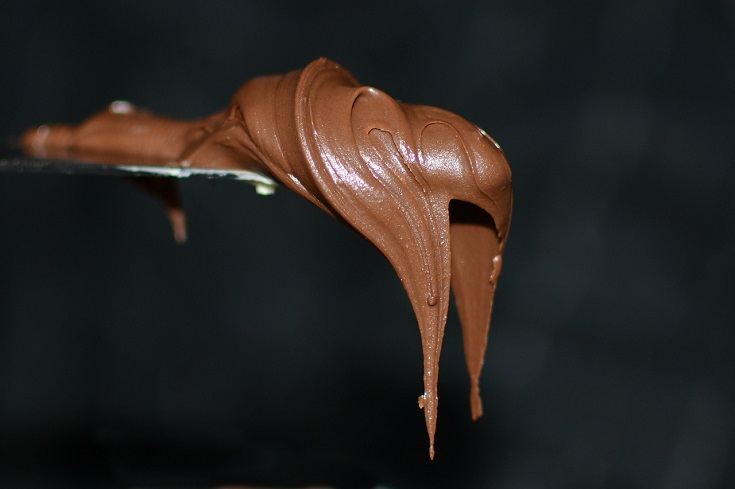
How Much Nutella Is Dangerous for a Dog?
It is important to be aware of how much Nutella your dog has consumed in order to know what measures to take.
- If approximately 20 mg of theobromine was consumed by a 2-pound dog, slight signs of intoxication may appear, which in general, will disappear in a few hours.
- If approximately 40–50 mg of theobromine was consumed, the clinical signs will be severe.
- If 60 mg of theobromine was consumed, seizures can occur.
- The lethal dose of theobromine in dogs has been calculated at 100–500 mg/kg of body weight.
As a result, a small amount (teaspoon) of Nutella consumed by a healthy 10-pound dog with no underlying liver ailments should not cause severe clinical signs. That said, Nutella has no nutritional value for dogs, and any amount can cause digestive issues due to the fats, sugar, and cocoa that it contains.
Basically, never give Nutella to your dog willingly because you risk making them sick.
What Could Happen If My Dog Ate Too Much Nutella?
Theobromine can lead to severe clinical signs if it is consumed in large quantities. This substance affects the central nervous, cardiovascular, and respiratory systems. It also has a diuretic effect. Clinical signs generally begin to occur within 2 hours of ingesting products containing cocoa (theobromine) but may last up to 24 hours because dogs metabolize theobromine very slowly.
- Vomiting (sometimes with blood)
- Increased thirst (polydipsia)
- Hyperexcitability
- Hyperirritability
- Racing heart rate (tachycardia)
- Excessive panting
- Wobbly walking
- Muscle contractions
In severe situations, theobromine can lead to cardiac arrhythmia, convulsions, and death, but this happens quite rarely.
Recovery can take up to 3 days because there is no specific antidote, only supportive treatment, which can include the following:
- Induction of vomiting if clinical signs have not occurred
- Administration of activated charcoal
- Intravenous fluids
- Oxygen
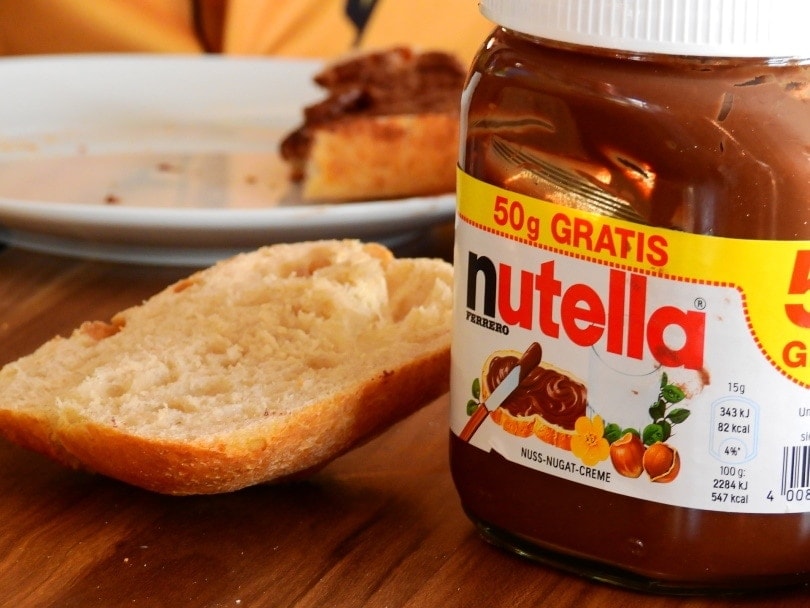
What Should I Do If My Dog Ate Nutella?
If your dog has ingested Nutella, the quantity is important. If the amount is very small, you probably have nothing to worry about. But if your dog has consumed large amounts, contact your veterinarian, and monitor the development of clinical signs. For absolute peace of mind, and for your pet’s health, it’s best to always seek veterinary attention if your dog has ingested Nutella.
- Decreased appetite
- Lethargy
- Vomiting
- Yellow-muddy diarrhea
- Fever
- Dehydration
- Abdominal pain (your dog may sit in a praying position with their chest on the ground and their rear end raised)
Also, make sure your dog can no longer access and eat Nutella.
Frequently Asked Questions
What Happens If My Dog Eats a Whole Jar of Nutella?
If your dog ate a whole jar of Nutella, severe clinical signs could appear (vomiting, diarrhea, rapid heartbeats, etc.). In addition to cocoa (which is toxic for dogs), Nutella contains hazelnuts and sugar, two ingredients that could lead to pancreatitis and digestive disorders. So, keep the Nutella jar away from your dog’s prying nose, especially if they have a sweet tooth.
Can Dogs Have Hazelnuts?
Hazelnuts are not toxic to dogs but are also not something that they should eat regularly. Excess hazelnuts in a dog’s diet can lead to digestive disorders and/or pancreatitis. Clinical signs that could indicate pancreatitis are yellow-muddy diarrhea, abdominal pain, vomiting, lethargy, and low appetite. Contact your veterinarian if your dog has consumed hazelnuts and these clinical signs have appeared.

Final Thoughts
Nutella, despite its low content of cocoa, is considered toxic for dogs. In addition, you should never give Nutella to your pet willingly because this product has a high sugar and fat content, which could lead to pancreatitis, and cocoa also contains theobromine, an alkaloid toxic to dogs.
The more theobromine is consumed, the more severe the clinical signs will be. In rare cases, it can even lead to the death of your pet. Theobromine poisoning may include nervous, cardiac, and respiratory signs. So, it’s best to keep Nutella out of your dog’s reach and not expose them to the risk of poisoning.





